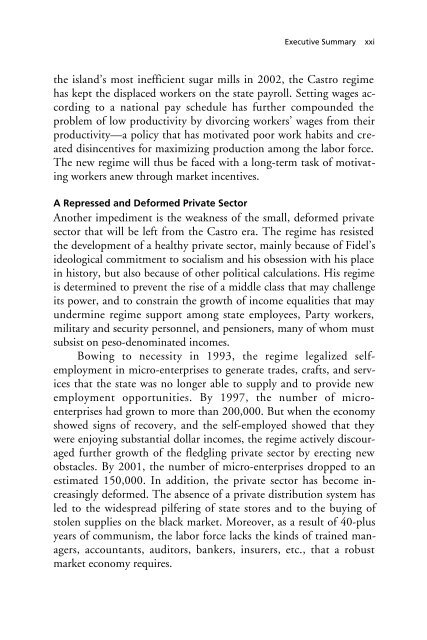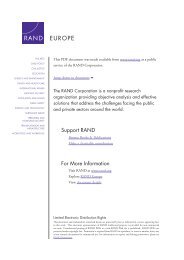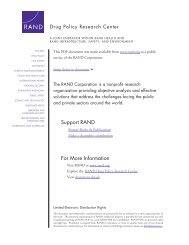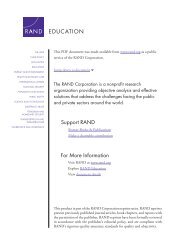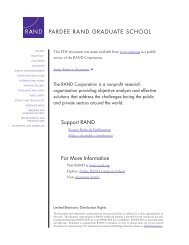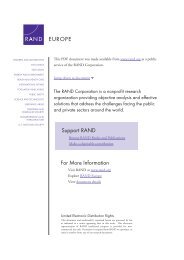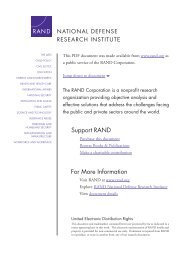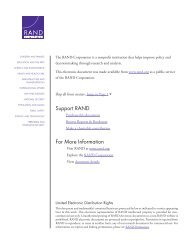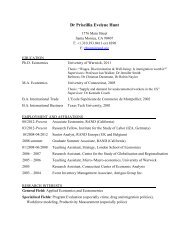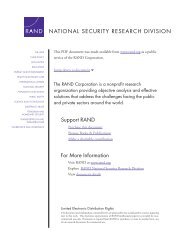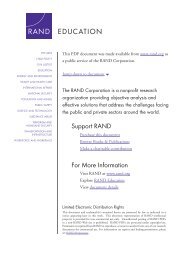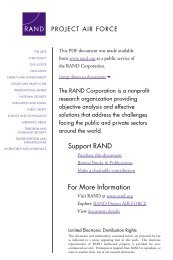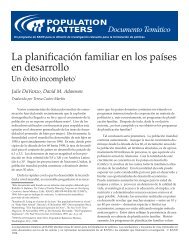Cuba After Castro - RAND Corporation
Cuba After Castro - RAND Corporation
Cuba After Castro - RAND Corporation
Create successful ePaper yourself
Turn your PDF publications into a flip-book with our unique Google optimized e-Paper software.
Executive Summary xxi<br />
the island’s most inefficient sugar mills in 2002, the <strong>Castro</strong> regime<br />
has kept the displaced workers on the state payroll. Setting wages according<br />
to a national pay schedule has further compounded the<br />
problem of low productivity by divorcing workers’ wages from their<br />
productivity—a policy that has motivated poor work habits and created<br />
disincentives for maximizing production among the labor force.<br />
The new regime will thus be faced with a long-term task of motivating<br />
workers anew through market incentives.<br />
A Repressed and Deformed Private Sector<br />
Another impediment is the weakness of the small, deformed private<br />
sector that will be left from the <strong>Castro</strong> era. The regime has resisted<br />
the development of a healthy private sector, mainly because of Fidel’s<br />
ideological commitment to socialism and his obsession with his place<br />
in history, but also because of other political calculations. His regime<br />
is determined to prevent the rise of a middle class that may challenge<br />
its power, and to constrain the growth of income equalities that may<br />
undermine regime support among state employees, Party workers,<br />
military and security personnel, and pensioners, many of whom must<br />
subsist on peso-denominated incomes.<br />
Bowing to necessity in 1993, the regime legalized selfemployment<br />
in micro-enterprises to generate trades, crafts, and services<br />
that the state was no longer able to supply and to provide new<br />
employment opportunities. By 1997, the number of microenterprises<br />
had grown to more than 200,000. But when the economy<br />
showed signs of recovery, and the self-employed showed that they<br />
were enjoying substantial dollar incomes, the regime actively discouraged<br />
further growth of the fledgling private sector by erecting new<br />
obstacles. By 2001, the number of micro-enterprises dropped to an<br />
estimated 150,000. In addition, the private sector has become increasingly<br />
deformed. The absence of a private distribution system has<br />
led to the widespread pilfering of state stores and to the buying of<br />
stolen supplies on the black market. Moreover, as a result of 40-plus<br />
years of communism, the labor force lacks the kinds of trained managers,<br />
accountants, auditors, bankers, insurers, etc., that a robust<br />
market economy requires.


